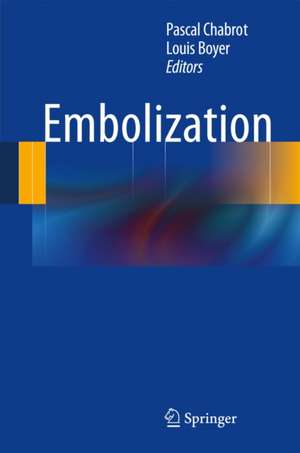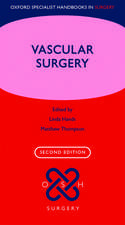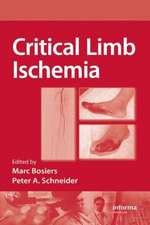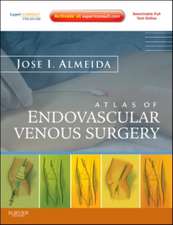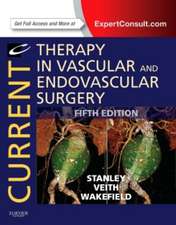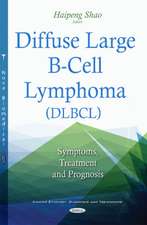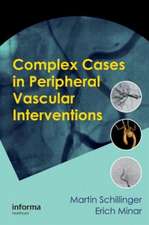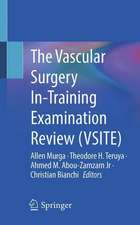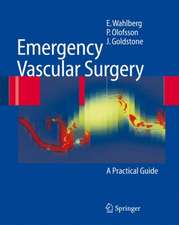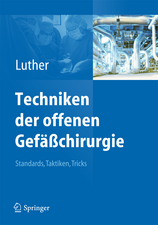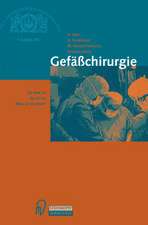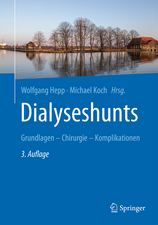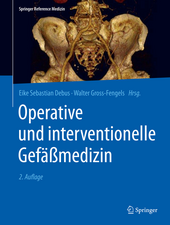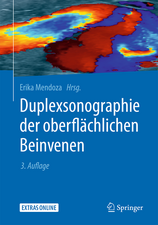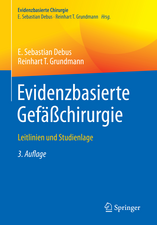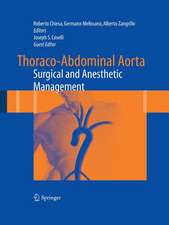Embolization
Editat de Pascal Chabrot, Louis Boyeren Limba Engleză Hardback – 2 sep 2013
This book is a handy pocket guide for trainee vascular radiologists, and serves as an aide-memoire for senior vascular radiologists. Each procedure is shown in its entirety and also discusses expected outcomes.
The first part of the book covers the materials and techniques used; the second part deals with the general physiopathological principles of embolization; and the third part analyses the main anatomo-clinical situations and strategies.
This book is a handy and accessible guide for quick reference aimed at clinical interventional radiologists in multidisciplinary staff rooms and angiography suites.
| Toate formatele și edițiile | Preț | Express |
|---|---|---|
| Paperback (1) | 662.14 lei 6-8 săpt. | |
| SPRINGER LONDON – 27 aug 2015 | 662.14 lei 6-8 săpt. | |
| Hardback (1) | 741.51 lei 6-8 săpt. | |
| SPRINGER LONDON – 2 sep 2013 | 741.51 lei 6-8 săpt. |
Preț: 741.51 lei
Preț vechi: 780.54 lei
-5% Nou
Puncte Express: 1112
Preț estimativ în valută:
141.91€ • 147.60$ • 117.15£
141.91€ • 147.60$ • 117.15£
Carte tipărită la comandă
Livrare economică 14-28 aprilie
Preluare comenzi: 021 569.72.76
Specificații
ISBN-13: 9781447151814
ISBN-10: 144715181X
Pagini: 384
Ilustrații: XVII, 453 p.
Dimensiuni: 155 x 235 x 25 mm
Greutate: 1.06 kg
Ediția:2014
Editura: SPRINGER LONDON
Colecția Springer
Locul publicării:London, United Kingdom
ISBN-10: 144715181X
Pagini: 384
Ilustrații: XVII, 453 p.
Dimensiuni: 155 x 235 x 25 mm
Greutate: 1.06 kg
Ediția:2014
Editura: SPRINGER LONDON
Colecția Springer
Locul publicării:London, United Kingdom
Public țintă
Professional/practitionerCuprins
1. The Tool Box: Catheterization Devices and Embolization Agents.- 2. Vascular Occlusions and Parenchymal Embolizations: Principles.- 3. Hemorrhages of the ENT Area.- 4. Massive Hemoptysis: Radiological Management.- 5. Embolization of the Pulmonary Artery.- 6. Hepatic Artery Embolization.- 7. Chemoembolizations and Hepatic Intra Arterial Chemotherapies.- 8. Portal Vein Embolization.- 9. Splenic Arterial Embolization.- 10. Gastro Intestinal Tract Arterial Haemorrhages.- 11. True and false Aneurysms of Visceral and Renal Arteries.- 12. Hypogastric Arteries: Aneurysms, Occlusions Before Stent-Grafting.- 13. Renal Arterial Embolizations.- 14. Anticoagulant Related Hematomas.- 15. Embolization of Varicoceles.- 16. Embolization of the Internal Pudendal Arteries for High Flow Priapism.- 17. Embolization of Endoleaks Ater Endovascular Abdominal Aortic Aneurysms Repair (EVAR).- 18. Post Partum Haemorrhages.- 19. Uterine Fibroid Embolization (UFE).- 20. Pelvi-Perineal Venous Insufficiency.- 21. Embolizations of Abdominal and Pelvic Traumas.- 22. Traumatisms of the Limbs.- 23. Management of Vascular Malformations.- 24. Miscellaneous/Marginal/Evolving Indications (Other Abdomino-Pelvic Tumors, Portal Hypertension Related Varicose Veins, Osteoarticular Pathologies)
Notă biografică
Pascal Chabrot, PhD, is renowned in his area and has published widely in both French and English, including in Acta Radiol., Journal Radiol., Journal des Maladies Vasculaires, and in a number of books. He has given numerous talks and lectures, and has held the post of head of the faculty of medicine at the university of Clermont-Ferrand since 2004, as well as having served in the French military medical service and having been awarded the bronze Medal for National Defence. He is an active member of a number of societies such as the Société Française de Radiologie, the Société Française d’Imagerie Cardio-Vasculaire and the Société Française d’Abord Veineux. He is also a junior member of the international Cardio-Vascular and Interventional Radiological Society of Europe.
Louis Boyer, PhD, Professor and a distinguished authority in this area, who has sat on the committees of numerous French and international working groups, societies and commissions. These include: the European Association of Radiology, the Society of Cardiovascular and Interventional Radiology (USA,) the Cardio-Vascular and Interventional Radiological Society of Europe, the Société Française d’Imagerie Cardio-Vasculaire; as well as having been the secretary for many groups and societies in France. He has a strong research record, and since 2006 has been on the national list of experts in the field of medical accidents (with emphasis on interventional radiology.) His university credentials are numerous; he has held such posts as director of research (Université d’Auvergne), head of the Clinic at the Faculty of Medicine (Clermont-Ferrand)v and elected member of the sub-section of the CNU since October 2000. He is currently the head of the vascular radiology service at the G. Montpied hospital (CHU de Clermont-Ferrand)
Louis Boyer, PhD, Professor and a distinguished authority in this area, who has sat on the committees of numerous French and international working groups, societies and commissions. These include: the European Association of Radiology, the Society of Cardiovascular and Interventional Radiology (USA,) the Cardio-Vascular and Interventional Radiological Society of Europe, the Société Française d’Imagerie Cardio-Vasculaire; as well as having been the secretary for many groups and societies in France. He has a strong research record, and since 2006 has been on the national list of experts in the field of medical accidents (with emphasis on interventional radiology.) His university credentials are numerous; he has held such posts as director of research (Université d’Auvergne), head of the Clinic at the Faculty of Medicine (Clermont-Ferrand)v and elected member of the sub-section of the CNU since October 2000. He is currently the head of the vascular radiology service at the G. Montpied hospital (CHU de Clermont-Ferrand)
Textul de pe ultima copertă
Innovations in catheterization techniques and embolization agents have considerably contributed to the development of endovascular occlusion techniques in arterial and venous trunks as much as distal parenchymal capillar beds. Mini invasive therapies, endovascular embolization and chemo-embolization now constitute valuable therapeutic alternatives in various fields: on a purely palliative or on a curative basis in oncology, but also in traumatology, functional diseases, and for the treatment of benign tumors, or when dealing with post-operative complications.
As in-depth and detailed descriptions of these techniques are all ready available in specialized books, our ambition is to provide a basic handbook for the young vascular radiologists in training and a checklist for the more experienced interventional radiologists, by providing for each of the constantly increasing indications a synthetic approach of the technique and its expected results.
The first part of this book relates to the tool box (the materials) and the procedure techniques as well as the physiopathological requirements for carrying out embolization; the second part is an analytical description of the main situations and anatomo-clinical strategies.
This handy book should to be a valuable memory aid for clinicians and interventional radiologists, readily available in the multidisciplinary staff rooms and in angiography suites.
As in-depth and detailed descriptions of these techniques are all ready available in specialized books, our ambition is to provide a basic handbook for the young vascular radiologists in training and a checklist for the more experienced interventional radiologists, by providing for each of the constantly increasing indications a synthetic approach of the technique and its expected results.
The first part of this book relates to the tool box (the materials) and the procedure techniques as well as the physiopathological requirements for carrying out embolization; the second part is an analytical description of the main situations and anatomo-clinical strategies.
This handy book should to be a valuable memory aid for clinicians and interventional radiologists, readily available in the multidisciplinary staff rooms and in angiography suites.
Caracteristici
Provides classification of the different embolization materials Didactic presentation, with key images for the diagnosis, tricky technical details, and principal results Compares embolization to other therapeutic options
